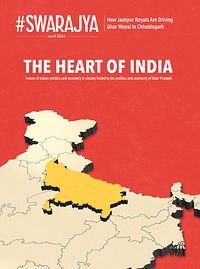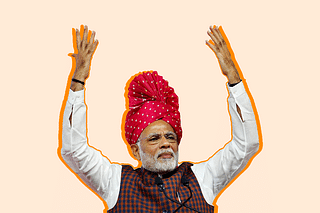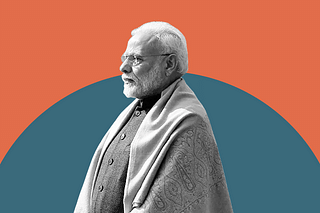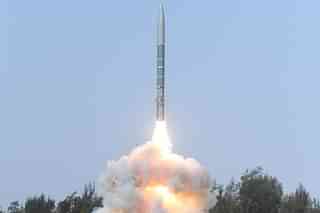Movies
Criticism Of 'Amaran' Teaser Belittles A National Hero
K Balakumar
Feb 24, 2024, 07:12 PM | Updated 07:23 PM IST
Save & read from anywhere!
Bookmark stories for easy access on any device or the Swarajya app.
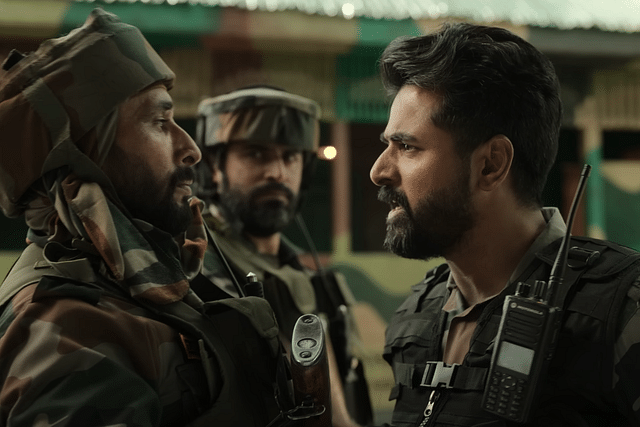
Even by the standards of the smoking tyre fire of social media platforms, this was a bit murky.
We are talking about the outrage in the Tamil sections of X (formerly Twitter) over the teaser of the upcoming film Amaran.
The film features one of the emerging stars of Tamil cinema, Sivakarthikeyan, and is produced by Kamal Haasan's Raaj Kamal Films.
Amaran is about Major Mukund Varadarajan, a Tamil who belonged to the forty-forth battalion of Rashtriya Rifles. He was killed in an encounter with Hizbul Mujahideen militants in Shopian, South Kashmir, in April 2014.
A 'braveheart', as the journalism cliché would have it.
Going by the slick trailer, the narrative seems to be centred on the pride and valour that Mukund and his cohorts shared for the Rashtriya Rifles regiment while taking on the terror elements in Kashmir.
In one clip, Sivakarthikeyan, who plays Mukund, is seen exhorting his fellow troops with the words 'terrorists should be petrified of Rashtriya Rifles as they take no prisoners and will hunt down the ultras' (a rough translation).
In another portion of the teaser, Mukund tells his unit not to hide their faces during a combing operation. 'Let them know this is the face of the Indian Army,' he says with typical spunk and spirit.
All through the teaser, there is talk of courage and standing up for your country.
Of course, it is too early to say with any degree of certainty how the movie will turn out, as film trailers can be skewed one way or the other. But having said that, with the film based on the life of an intrepid soldier and the terrorism in Kashmir — all real-life incidents — you can broadly understand its possible contour.
Anyway, on the Tamil side of X, the reactions have been typical and silly. For, this is the same section that prides itself on being liberal and allowing all kinds of views. But here they were, up in arms based on a teaser just one a half minutes long, which, in any case, is based on true events.
The words bandied around were the standard banalities: 'hypernationalistic' and 'Islamophobic'.
Further, the film being a Haasan venture, the Dravidian types went for the one thing that they never lose sight of — his Brahminical origins.
It doesn't matter that Haasan has publicly distanced himself from the community and its traditional practices. The E V Ramasamy (EVR)-worshipping Dravidians can never stop their caste-based navel gazing.
The likes of Haasan, N Ram, and T M Krishna, how much ever they paint themselves in woke hues, will be seen in their Brahminical colours by the Dravidologists.
Haasan's films like Vishwaroopam (2013) and Unnaipol Oruvan (2009) (a remake of Neeraj Pandey's 2008 Hindi film A Wednesday), which were also about anti-terror operations, were brought to the table. Both those films had been painted as being anti-Islamic.
Tamil Nadu Wasn’t Averse To Nationalism
That the two films were commercially successful and enjoyed popular acclaim does not matter anymore. In the current narrative in Tamil Nadu, any film that stands for Indian military and against terrorism gets slapped with the facile labels 'hypernationalistic' and 'Islamophobic'.
The situation wasn't this reductive and knee-jerky even until a few years ago.
A hero like Vijayakanth built his cinema lore based on movies in which he was a no-nonsense solider, a commando, or a secret agent beating the daylights out of terrorists who unfailingly had connections with 'the enemy nation of Pakistan'.
Vijayakanth would also give rousing speeches on patriotism and standing up for the safety and security of the nation, and they were all lapped up with gusto by the public.
Another actor whose CV is filled with such films is Arjun.
He is identified so strongly with such movies that he is said to have tattooed his arm with the Indian flag.
The fact that he is said to have been born on 15 August adds to the nationalistic allure built around him.
From then to now, the state has slipped into a strange hatred for the military as well as national sentiments. The reasons are not far to seek.
However, those films of Vijayakanth and Arjun were no nuanced or artistic explorations of the life of faujis or on military operations. They were mass-masala entertainers where every character was mostly a broadstroked creation.
In general, Tamil filmdom has no major tradition of films on the armed forces. To be sure, there have been many popular movies in which the hero has played the soldier-type role, but nothing like Haqeeqat (1964) or Upkar (1967), which explored the varying sentiments of the Indian soldiers during two different wars, the 1963 Sino-India and 1965 Indo-Pakistan wars, respectively.
In the black-and-white-film era, a few flicks did have war as a backdrop. From MGR to Sivaji, all have essayed the role of a soldier. Rajinikanth even acted in a film named Ranuva Veeran (1981) (Military Man).
But no film has gone into the depth of a military man's life, or try and get into the psyche of a youth wanting to get into the armed forces like, say, Vijeta (1982) or even Lakshya (2004) did in Hindi.
Amaran's Inspirational Value
One of the reasons often trotted out for Tamil Nadu not doing films about the armed forces very well is that the state has no great tradition of sending officers to the military. Nor has there been a big war in these parts.
It is a fact that three brilliant Tamils had been chiefs of army staff — P P Kumaramangalam (1966-69), Krishnaswamy Sundarji (1986-88), and Padmanabhan (2000-02). Not to forget V R Raghavan, who was the director general of military affairs. But, in general, among the youth there is more passion for engineering and finance rather than a career in the military.
And it is dwindling further with time, as the situation in the Madras Regiment, the oldest infantry regiment of the Indian Army, shows. The state's influence is apparently no longer there. Drill commands, which used to be given by NCOs in Tamil, are reportedly now replaced by Kannada, Telugu, and Malayalam, as the percentage of recruits from that state has increased.
In that sense, Amaran offers hope. In the teaser, there is a scene where the members of the forty-forth battalion of Rashtriya Rifles, commanded by Mukund, break out into the bravura verse of Nationalist Tamil poet Bharathiar. It was rousing to hear his famed line that there is no fear even when the sky falls over the head.
Amaran is directed by Rajkumar Periyasamy, who had been an assistant director in that much-acclaimed Vijay-starrer Thuppakki (2012). That film was about an intelligence officer in the Indian Army who seeks to destroy a terrorist sleeper cell. It was well-made, but played out as a thriller.
Amaran looks to be a different type. It seems to be more along the lines of the Hindi film Shershaah (2021), which was based on the life of Vikram Batra, killed in action in the Kargil War.
Mukund, too, was no less committed and lionhearted. He fought valiantly with the terrorists at Shopian before laying down his life. So, Amaran can potentially improve Tamil Nadu's fortunes in the Indian Army by being an inspiration to the state's youth.
Even otherwise, Mukund's story of patriotism and gallantry deserves to be told. The cry of hypernationalism is typically misplaced and belittles the selfless sacrifice of a true national hero.
Save & read from anywhere!
Bookmark stories for easy access on any device or the Swarajya app.
Introducing ElectionsHQ + 50 Ground Reports Project
The 2024 elections might seem easy to guess, but there are some important questions that shouldn't be missed.
Do freebies still sway voters? Do people prioritise infrastructure when voting? How will Punjab vote?
The answers to these questions provide great insights into where we, as a country, are headed in the years to come.
Swarajya is starting a project with an aim to do 50 solid ground stories and a smart commentary service on WhatsApp, a one-of-a-kind. We'd love your support during this election season.
Click below to contribute.
